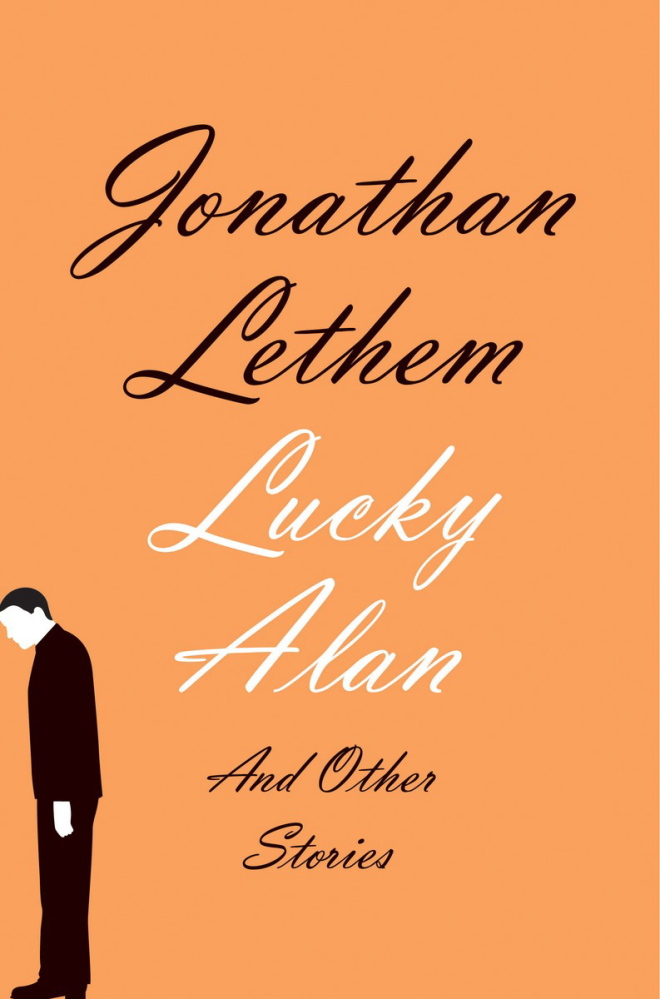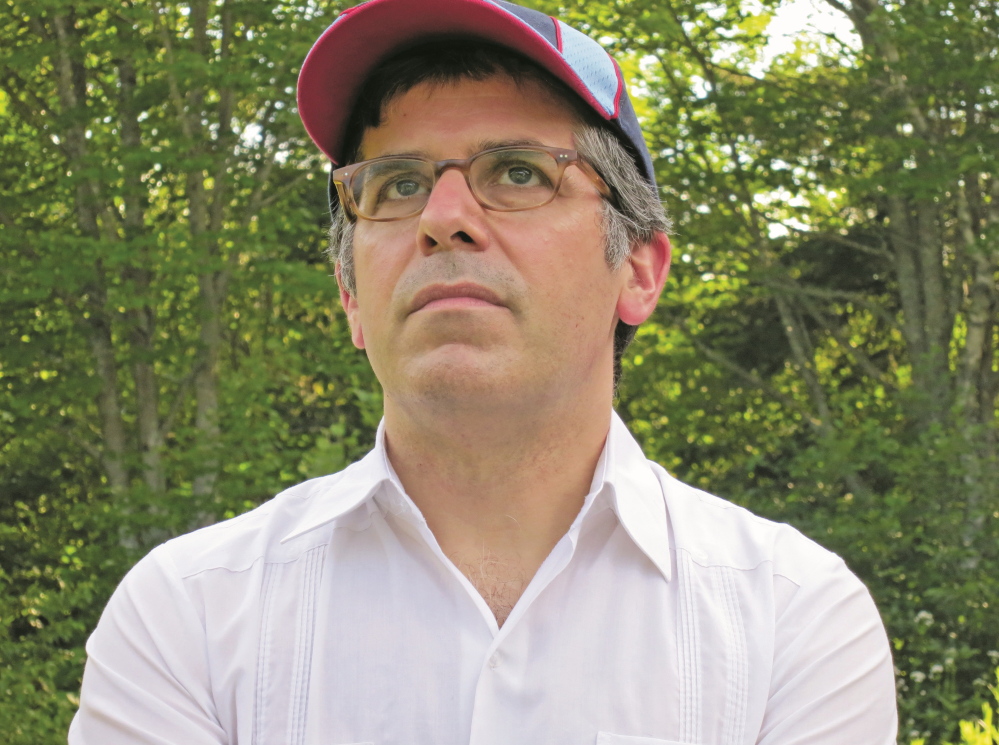Geographically speaking, novelist Jonathan Lethem may forever be most closely associated with Brooklyn. The borough is where he grew up, it’s in the title of his breakout book, “Motherless Brooklyn,” and it’s the setting for his acclaimed novel, “The Fortress of Solitude,” recently adapted into a musical by Itamar Moses and Michael Friedman.
Now, however, the author of “Dissident Gardens” and “Chronic City” leads a transcontinental existence, moving between Southern California and coastal Maine. During the school year, Lethem teaches at Pomona College in Claremont, California, as the Roy Edward Disney Professor in Creative Writing, a position formerly held by David Foster Wallace. (Not bad for someone who left Bennington College as a sophomore and never earned a college or university degree thereafter.) He spends summers at his farmhouse near Blue Hill with his wife, Amy Barrett, and their two sons. He is also co-founder of Red Gap Used Books in Blue Hill.
A recipient of a MacArthur “genius” grant and winner of a National Book Critics Circle Award, Lethem will publish his second collection of short stories, “Lucky Alan,” on Feb. 24. The nine selections highlight his gift for both well-observed realism and free-wheeling absurdity. The subjects include a fraught New York friendship, a father on the verge of a nervous breakdown at SeaWorld, the adventures of second-rate comics characters lost on a desert island, and a man’s strange transaction in a blizzard with a pack of wolves.
During the late 1980s and ’90s, Lethem worked as a bookseller at Moe’s Books in Berkeley, which is where I crossed paths with him through a long-running, informal writer’s workshop. From his Pomona office, Lethem talked about his connection to Maine, its influence on his work and the state of the short story.
Q: Your novels are mostly associated with either New York or California, both places you’ve resided. Now you’re spending part of the year in Maine. What inspired that arrangement?
A: I have, in some ways, a very characteristic New Yorker’s relationship to New England. You have to get out of New York at some point. We always fled the city in this typical spirit. One of our destinations was southern Maine, because one of my dad’s painting buddies, a guy named George Burk, had settled in Berwick. We would come up and hang out in North Berwick and Ogunquit, and as a kid I knew that stretch of coast pretty well. My first memory of flying a kite, for instance, was on Wells Beach.
About 20 years ago, when my father bailed out of Brooklyn, he joined his pal George in Berwick, and when I would come home from California to see my dad, I would visit him in Maine.
A little more than 10 years ago, right after I had met my wife, Amy, and we were beginning to think about buying a home, we couldn’t afford one in New York. We fell in love with this farmhouse in Blue Hill. Very impulsively, because we didn’t even own a car at that point, we made a down payment on it. Ever since then I’ve been really closely tied to Maine. I’m always really happy when I’m up there.
Q: Do you still co-own Red Gap Used Bxooks in Blue Hill?
A: Yes, but I’m like the spirit animal of that bookstore. I’m not quite there doing the hard work, and my sense of possession of it is kind of an indulgence on the part of my friends André (Strong) and Marjorie (Kernan), who really run the place. But I feel inordinately proud of being connected to a working used-book business.
You don’t find me at the counter very often, although in the summer I do a little bit of work there. I price some books, shelve some books and occasionally go on a buying run when there’s an estate sale or something. So I can just faintly claim to be keeping my hand in my old trade.
Q: What aspects of living in Maine do you find the most pleasant, or maybe the most challenging?
A: Well, there’s one story in “Lucky Alan” that’s kind of a snapshot of winter madness (“Traveler Home”). Everyone always warns you about the challenge of going through the whole winter. I watch how my father and my buddies at the bookshop kind of run screaming at some point in February or March and go some other place where they can forget what seems the permanent blizzard state. But I like it. I like the isolation. I thrive on a lot of what characterizes Maine in the off-season, the 10 and a half months when it’s not a summer destination.
Q: What do you feel is the state of short fiction these days?
A: I don’t know whether the prospects for the short story are better or worse or in any way different than they’ve always been. No one could ever figure out how to sell (a collection) as well as they can sell a novel. From the publishing perspective, they’re an indulgence. They’re something that everyone does for love, not for money.
I vowed to myself at some point that whatever else was coming at me in terms of obligations or temptations, I would write one short story that I was really proud of per year. That I would never let myself get further from the craft than that.
Q: Do you find that your readers are willing to go wherever you take them in your fiction, or are there distinct camps that prefer your more realistic stories as opposed to the clearly fantastical ones?
A: I have no doubt that I’ve mastered the art of disappointing some large swath of readers every time I do anything, because I’ve presented so many different kinds of faces. But I know that sometimes readers latch on to something a writer does: “Come on, that’s what you’re good at. Do that thing. Stop doing this other thing.”
Q: Your collection contains only the stories, with no foreword, introductions or notes. Why not include any explanatory material?
A: We live in an age of explanation, of lots and lots of “behind the music” kind of things. I can be thrilled by those glimpses of context or the chance to read an interpretive plaque on the museum wall beside the painting. But I also realize that sometimes I’m reading the plaque instead of looking at the painting.
On the whole, I’m more afraid of there being too much of that stuff than of there being too little. I might even, if I had my way, have there not be any jacket-flap copy, either. Then again, here we are. This interview may itself become, potentially, someone’s framing or explanation. It’s always out there if people crave it. But in the book itself it’s nice to let the reader’s brain make a direct landing on the planet of the story with no intermediary.
Q: You mentioned that “Traveler Home” is Maine-based, and one of the stories, “Pending Vegan,” is set very clearly as kind of a “Southern Californian dad” story. Do you see yourself including more of your personal geography into your fiction?
A: Actually, there’s this novel, not the one I’m working on right now, but it’s a totally conceived thing I just have to clear out the place for and write. It’s about a kid who grew up in Farmington. Why it’s Farmington exactly, I’m not even sure… But, yeah, Maine is going to seep more into my work.
Q: What has it been like for you to watch “Fortress of Solitude” be adapted for the stage as a musical theater piece by Itamar Moses and Michael Friedman?
A: I loved the show. It was hugely moving to watch my book entering into that very human process known as theater. Different, I think, from the way I’d experience a film adaptation. I sort of fell in love with the whole creative team and the cast, all of whom had entered into a sustained exploration of the book that brought it back to life for me in unexpected and gratifying ways.
Q: Before I let you go, can you say anything about what you’re working on now?
A: Well, it won’t be coming out next year, but maybe I can finish this novel I’ve got in progress for 2017. I think there’s a chance of that. It’s a little shorter and less grandiose than either “Dissident Gardens” or “Chronic City.”
It’s about a professional backgammon hustler who grew up in the United States but has become a Graham Greene, louche, expatriate type. If he were played in a movie, it would probably be by Jeremy Irons as kind of a fake transatlantic sophisticate. It partly grows out of the semester sabbatical I had at the American Academy in Berlin, so one of the settings for this guy is contemporary Germany. It’s something I’m liking a lot.
Northern New England native Michael Berry is a writer and reviewer whose articles have appeared in various national and local publications. He has been the science fiction/fantasy columnist for the San Francisco Chronicle for many years. He can be contacted at:
mikeberry@mindspring.com
Twitter: @mlberry
Send questions/comments to the editors.




Comments are no longer available on this story